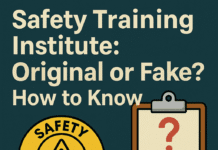
Safety Trained Supervisor (STS): Ensuring Workplace Safety
Safety in the workplace is a paramount concern for any organization. Among the many roles dedicated to maintaining a safe working environment, the Safety Trained Supervisor (STS) stands out as a key figure. Their expertise and guidance play a pivotal role in safeguarding employees and mitigating potential risks.
Introduction to Safety Trained Supervisor (STS)
The role of an STS revolves around being a guardian of workplace safety. They are trained professionals equipped with the knowledge and skills necessary to identify hazards, implement safety protocols, and ensure adherence to regulatory standards. Their presence is indispensable in diverse industries where the well-being of employees is a top priority.
STS Certification Process
Becoming an STS involves a rigorous certification process. Individuals aspiring for this role must meet specific eligibility criteria, undergo comprehensive training modules covering various safety aspects, and pass a stringent examination to acquire the certification.
Responsibilities of an STS
An STS shoulders multifaceted responsibilities. They oversee the implementation of safety measures, provide training and guidance to employees on safety protocols, and efficiently handle and report incidents to prevent recurrences.
Benefits of Having an STS
Employing an STS yields numerous advantages. From significantly reducing accidents and injuries to ensuring compliance with regulations, having an STS in the workforce contributes to improved morale and enhanced productivity.
STS in Various Industries
The impact of an STS extends across industries like construction, manufacturing, and healthcare. Their role remains pivotal in implementing tailored safety measures relevant to each sector’s unique risks.
Challenges Faced by STS
Despite their crucial role, STS professionals encounter challenges such as balancing productivity with safety concerns, staying updated with evolving safety standards, and overcoming communication barriers in diverse workplace environments.
Continuous Improvement for STS
To stay effective, STS professionals engage in continuous education and skill development. Staying abreast of industry changes and upgrading their expertise is fundamental to fulfilling their role optimally.
The Safety Trained Supervisor (STS) certification is a program designed to enhance the knowledge and skills of supervisors regarding workplace safety. This certification covers various aspects of safety protocols, hazard recognition, incident investigation, and safety regulations relevant to different industries.STS certification typically involves training in:
- Safety Leadership: Understanding the role of a supervisor in promoting a culture of safety, communication, and leading by example.
- Hazard Recognition: Identifying potential risks and hazards in the workplace, including environmental, physical, and chemical hazards.
- Incident Investigation: Learning how to conduct thorough investigations into workplace incidents to determine causes and prevent future occurrences.
- Regulatory Compliance: Understanding and adhering to relevant safety regulations and standards set by governing bodies or organizations.
By obtaining the STS certification, supervisors demonstrate their commitment to creating and maintaining a safe work environment for employees while also ensuring compliance with safety regulations.Conclusion
The presence of a Safety Trained Supervisor is not just a necessity but a strategic investment in workplace safety. Their expertise, coupled with ongoing advancements in safety measures, ensures a safer and more secure work environment for all.
Occupational Hygiene and Safety Technician (OHST)
Safety Management Specialist (SMS)
How to Obtain SAMTRAC Certification
Unique FAQs
- What distinguishes an STS from other safety personnel?
- An STS holds a specific certification demonstrating comprehensive knowledge in safety measures, incident handling, and employee training, setting them apart from other safety personnel. Their role encompasses a broader oversight of workplace safety beyond routine safety officers.
- Can an STS work across different industries?
- Yes, an STS’s expertise is adaptable across various industries. While specific safety measures may differ, the fundamental knowledge and skill set of an STS allow them to navigate and implement tailored safety protocols in diverse work environments.
- How often should an STS update their skills?
- Continuous learning is pivotal for an STS. Regular updates through workshops, courses, and staying informed about evolving safety standards ensure their skills remain current and aligned with industry best practices.
- Are there global standards for STS certification?
- While certification standards might vary by region or institution, there are recognized global standards for safety certifications that align with international safety regulations. Prospective STS professionals should seek certifications that adhere to these global standards.
- What impact does an STS have on employee morale?
- An STS’s presence positively influences employee morale. Knowing that there’s a dedicated professional overseeing their safety fosters a sense of security and trust among employees, contributing to a more positive and productive work atmosphere.

























How to compete STS course
How to complete the STS course